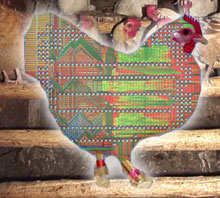Technology Note/Chicken Chips
Air Date: Week of July 26, 2002
Living on Earth’s Cynthia Graber reports on research into using chicken feathers as the base material for computer chips.
Transcript
CURWOOD: Just ahead, designing fishing nets that let a lot of them get away. First, this Environmental Tech Note from Cynthia Graber.
[MUSIC UP AND UNDER]
GRABER: Computers are getting smaller and faster at breakneck speed. And some folks in the computer-making business say we may soon reach the end of this exponential change unless there’s a new breakthrough in design or material.
Well, one scientist at the University of Delaware thinks that breakthrough may come on the wings of a chicken. When the Tyson Chicken Company offered to give renewable resources engineer, Richard Wool, two billion pounds a year of feathers it pulls off its birds, he got an idea.

He knew that silicon, the medium used in making computer chips, is one of the limiting factors to the speed at which information can travel. He also knew that information travels faster through air than through silicon. And finally, he knew that the fibers of little chicken hairs are hollow.
So, Wool made a series of small circuit plates out of compressed chicken feathers and sent and electric signal across them. He found that the chicken feathers carried the signal at about twice the speed of silicon. This research is just beginning. And Wool says it could be years, if ever, before computers can be made from feathers. But, he says, if his preliminary research holds up, our electronic gear of the future could be lighter, faster and fluffier. That’s this week’s Technology Note. I’m Cynthia Graber.
[MUSIC UNDER]
CURWOOD: And you’re listening to Living on Earth.
[MUSIC: WILCO, "WAR ON WAR," YANKEE FOXTROT HOTEL, NONESUCH, 2002]
Living on Earth wants to hear from you!
Living on Earth
62 Calef Highway, Suite 212
Lee, NH 03861
Telephone: 617-287-4121
E-mail: comments@loe.org
Newsletter [Click here]
Donate to Living on Earth!
Living on Earth is an independent media program and relies entirely on contributions from listeners and institutions supporting public service. Please donate now to preserve an independent environmental voice.
NewsletterLiving on Earth offers a weekly delivery of the show's rundown to your mailbox. Sign up for our newsletter today!
 Sailors For The Sea: Be the change you want to sea.
Sailors For The Sea: Be the change you want to sea.
 The Grantham Foundation for the Protection of the Environment: Committed to protecting and improving the health of the global environment.
The Grantham Foundation for the Protection of the Environment: Committed to protecting and improving the health of the global environment.
 Contribute to Living on Earth and receive, as our gift to you, an archival print of one of Mark Seth Lender's extraordinary wildlife photographs. Follow the link to see Mark's current collection of photographs.
Contribute to Living on Earth and receive, as our gift to you, an archival print of one of Mark Seth Lender's extraordinary wildlife photographs. Follow the link to see Mark's current collection of photographs.
 Buy a signed copy of Mark Seth Lender's book Smeagull the Seagull & support Living on Earth
Buy a signed copy of Mark Seth Lender's book Smeagull the Seagull & support Living on Earth

